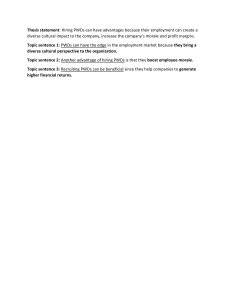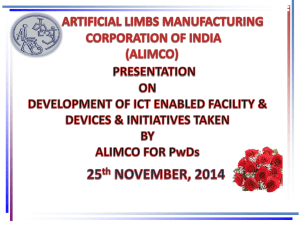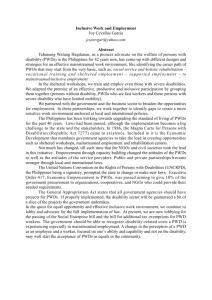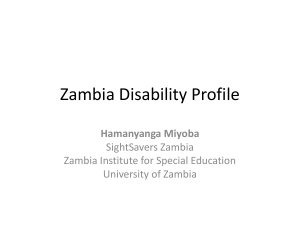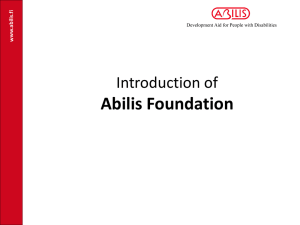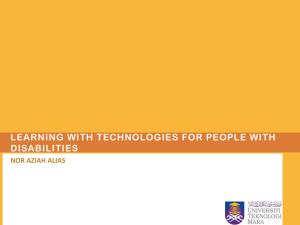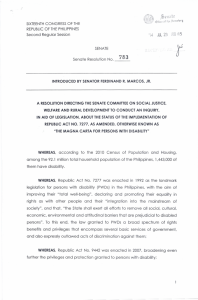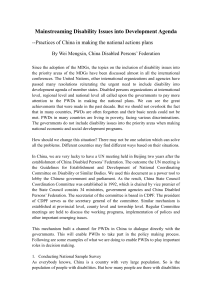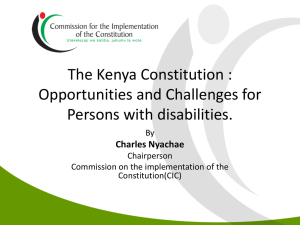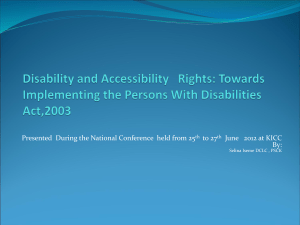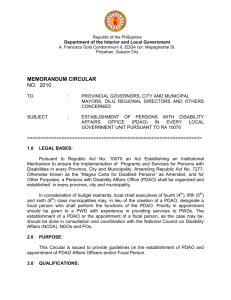PWD EMPLOYABILITY: Philippine Experience
advertisement
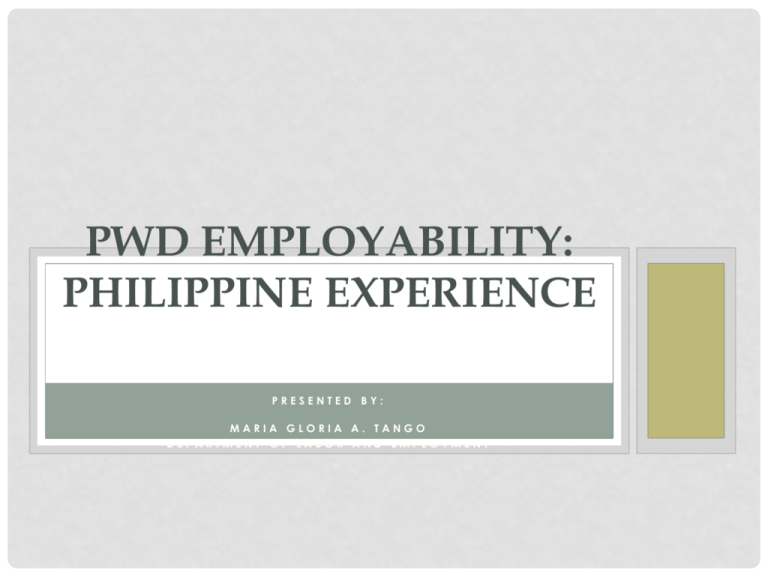
PWD EMPLOYABILITY: PHILIPPINE EXPERIENCE PRESENTED BY: MARIA GLORIA A. TANGO DEPARTMENT OF LABOR AND EMPLOYMENT PRESENTATION OUTLINE I. Introduction II. Philippine Profile of Persons with Disability III. Philippine Laws for the Protection and Welfare of the PWDs IV. Issues/Barriers Relating to Employability Confronting PWDs V. Programs to Improve PWD Employability I. INTRODUCTION Philippine State Policy on PWD: “The State shall establish a special agency for disabled persons for their rehabilitation, selfdevelopment and self-reliance and their integration into the mainstream of the society” (Sec. 13, Article XIII- Social Justice and Human Rights, 1987 Philippine Constitution) Philippine Vision on PWDs: Empowered and productive citizens with the recognition of their rights to self-presentation and participation in decisionmaking process to facilitate their access to education, training and employment, health services and other services that will meet their needs and inclusion in the mainstream of social, economic, cultural, political and civil life. II. PWD PROFILE * About 16 per thousand of the country’s population had disability - of the 92.1 million household population in the country, 1,443 thousand persons or 1.57% has disability (based on 2010 Population Census) - in the 2000 Population Census, PWDs was 935,551 persons * There were more males than females among persons with disability - males account for 50.9% while female compromise 49.1% - there were more females with disability than males in the age group 65 years and over (in this age group, there is higher survival of women than men) * Disability was highest among persons aged 5 to 19 years - for every 5 PWDs, one (18.9 %) was aged 0 to 14, three (59.05%) were in the working age group (aged 15 to 64 years), and one (22.1%) was aged 65 years and over - children aged 10 to 14 comprised the largest age group (7.2%), followed by those in age groups 15 to 19 years (6.9%) III. DISABILITY-RELATED LAWS 1. Republic Act 7277 – “Magna Carta for Disabled Persons” but later amended as “Magna Carta for Persons with Disability”, signed into law on March 24, 1992 - provides for the rights of the PWDs such as right to equal employment opportunities; access to quality education; access to health services; provision of necessary auxiliary services; access to telecommunication services; barrier-free environment; free exercise of political and civil rights 2. Republic Act No. 9442, amended in part RA 7277 (signed into law on April 30, 2007) - a new chapter entitled “Other Privileges and Incentives” was added - provides 20% discount from hotels & restaurants; purchase of medicines; admission to theaters and cinemas; medical & dental services; on fare for domestic and sea travel; PWD express lanes in commercial & gov’t establishments 3. Republic Act. 10524 further amended in part RA 7277 (signed to law, April 23, 2013) - amended the Section that provided 5% of all casual, emergency and contractual positions in the DSWD, DOH, DECS and other gov’t agencies, offices or corporations in social development to reserved for PWDs - now, it provides that at least 1% of all positions in all gov’t offices shall be reserved for PWDs; private corporations with more than 100 employees are encouraged to reserve at least 1% of all positions for PWDs 4. Executive Order No. 147, signed on March 22, 2005 - enjoined several agencies to support and cooperate in the implementation of the economic programs of the PWDs - programs include: social preparation program; system of equivalency to ensure PWDs access to employment & entrepreneurship; develop & implement unified training program; cooperative organizing & development; develop & implement marketing promotion & product development; project positive image of the PWDs 5. Batas Pambansa Bilang 344- mandates concerned gov’t agencies & private sector to facilitate the installation of structures & facilities that will allow easier mobility of PWDs IV. ISSUES/BARRIERS TO PWD EMPLOYABILITY 1. Low implementation of disability related laws - Accessibility Law - Utilization of at least 1% of gov’t agency budget for disability related concerns - Percentage of employees reserved for PWDs - Procurement of at least 10% of agency requirements of goods & services from PWD coops 2. Continuing discrimination against PWDs for employment - lesser information on job vacancies - lack of qualification (appropriate skills) 3. Lack of database on PWDs, particularly in the labor force - need to include PWD info in the conduct of Population Census V. PROGRAMS TO IMPROVE PWD EMPLOYABILITY 1. Job Search Assistance (Employment Facilitation) a. Utilize the Public Employment Service Offices b. Conduct of Job Fair c. Tap the DOLE on-line job matching systemPhil-jobnet d. Career coaching for graduating high school students e. Pre-employment counselling 2. Skills and entrepreneurial trainings a. Training for Work Scholarship Program provided by TESDA b. Community-based trainings provided by LGUs c. Institution-based trainings provided by various colleges, universities, TVIs and private organizations • 3. Sustainable Livelihood Programs a. Tulong Alalay sa Taong May Kapansanan (TULAY) - this program aims to assist in the integration of PWDs into the society by providing them training and employment opportunities both in the formal and informal sector - it has 2 components: wage employment and self-employment/livelihood - Under the self-employment/livelihood component, the PWDs are provided with capacity-building services such as: working capital in the form of materials/inputs, equipment, tools and jigs to be able to start a livelihood undertaking or enhance an existing one - appropriate short-term trainings will also be provided: massage, plumbing, cosmetology, electrical servicing, welding, native snacks preparation, car wash, motorcycle repair, cellular phone repair; appliances repair, upholstery repair - From 1995 to 2012, the program was able to assist a total of 37,000 beneficiaries - Several livelihood projects operated by PWDs have been successful and can be showcased as models for other similarly-situated groups to establish their own income-generating projects for the upliftment of their well-being THANK YOU VERY MUCH! MARAMING SALAMAT PO!
